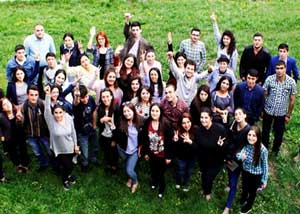Engaging with Armenia

One of the four programming pillars of the Armenian Communities Department of the Calouste Gulbenkian Foundation is providing support to Armenia, with particular emphasis on civil society and youth. We have asked our “Focal Point” in Armenia, Dr. Hamazasp Danielyan, to highlight some of the initiatives which we support.
We are cooperating with the Jinishian Memorial Foundation (JMF) which is implementing two flagship programs: Youth Action for Change (YAC) and Civic Dialogue and Action for Change (CDA). Support to these programs started in 2015. YAC is designed to empower young people who recently graduated from universities to engage with local stakeholders, such as municipal authorities and non-governmental organizations, to implement projects in the areas of environmental protection, human rights promotion and economic development. Most recently, 75 individuals have been engaged to implement eight different projects in and around three major cities in Armenia (Gavar, Gyumri and Vanadzor).
Similarly, CDA targets several hundred students and young adults in seven major cities that host higher educational institutions, including Yerevan, by encouraging civic engagement through a series of seminars and discussions. CDA also supports “action groups” to design and implement various types of small projects. Thirteen such projects have been implemented this year with a wide range of goals, including assistance to the integration of Syrian Armenian peers, the organization of the first female football championships in Ijevan, raising awareness of the rights of people with disabilities, and restoring books in local libraries.
We recently provided our technical and financial support to “Boon” cultural and educational foundation to create “Boonus,” the first Armenian language interactive online educational platform for schools in Armenia. In the framework of this project we also support the development of an online civic education course, making high quality lectures and other educational materials available to all secondary school students across the country.
We support academic and literary publications, using both electronic and print media, with an emphasis on contemporary and 20th century writers. For example, we are engaged with “Inknakir Literary Club” NGO that focusses on current literature, Sargis Khatchents/PrintInfo publishing house, Ashot Johannisyan Institute, and Yerevan State University’s publishing house. We have a project with the Tumo Center for Creative Technologies to have young people around the world write an online participative graphic novel in Armenian. To encourage independent media, as well as journalism in Western Armenian, we support Hetq online and Yerakouyn.com. An individual initiative called “Inch k’sem, inch k’ses” that produces a series of TV programs dedicated to the discussion of differences between the two branches of the Armenian language also merits funding.
We have partnered with Wikimedia Armenia for several years to help them with their initiatives related to writing Wikipedia articles in Western Armenian, including the organization of writing camps for youth in the diaspora.
An important part of our programming in Armenia relates to academic research. Last autumn we supported the Diaspora Studies Department of the Yerevan State University to organize an academic conference dedicated to the Armenian Diaspora in the Russian Federation. Many experts from Russia, Armenia and elsewhere were present. Selected papers presented during this conference will be published soon. We will also provide some funding to graduate students to conduct fieldwork research on Armenian communities in the post-Soviet space.
Our scholarship program designed specifically to support university students and young academics in Armenia to participate in academic conferences abroad continues. 70 people have benefited from this program during the first eight months of 2017.
We renewed our collaboration with the American University of Armenia’s (AUA) Digital Library of Armenian Literature (Digilib). The works of Zabel Yessayan are being digitized and published online. In addition, we supported two summer courses: one on political science research methods organized by AUA’s Extension Program. The other, on diaspora studies, was organized by the Armenian Higher Education Initiative. It was an intensive two week program which took place at AUA as well. It was taught by professors from Armenia and the Diaspora. The class was comprised of 20 graduate students.
Finally, our collaboration continues with the Ministry of Diaspora. As a result of this cooperation four professionals were recruited as part of a Secretariat within the Ministry to support its efforts in the integration of and support to Syrian Armenians who have arrived as refugees in Armenia during the past several years. One component of the work is to provide services to individuals who need assistance. The other component is related to the development of a national strategy for the integration of displaced persons from Syria into Armenian society.
A national strategy, followed by a more specific implementation plan, are crucial documents for obtaining international assistance to help with refugee integration. The Armenian Communities Department, working closely with the Ministry of Diaspora, the UNHCR, the AGBU and others, has been instrumental in the development of the Strategy since the beginning of 2017.
The Department also contributes to a special program that assists university students from Syria studying in Armenia to pay their tuition fees. This successful initiative, in place since 2013, directly supports hundreds of students. It is jointly funded by the Calouste Gulbenkian Foundation, Saint Sarkis Charity Trust in London, the AGBU and the Government of Armenia through the Ministry of Diaspora.
Dr. Hamazasp Danielyan was appointed in 2016 as Adviser to Programs in Armenia and acts as the Department’s “Focal Point.” His responsibilities include initiating and following up on projects, developing partnerships and attending various official and working meetings.
The Armenian version of this article can be consulted below.
